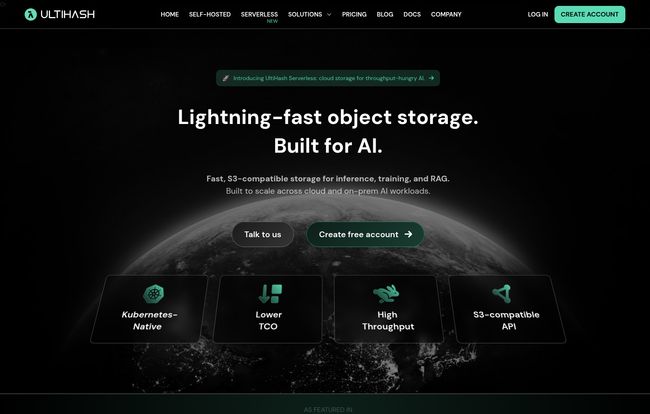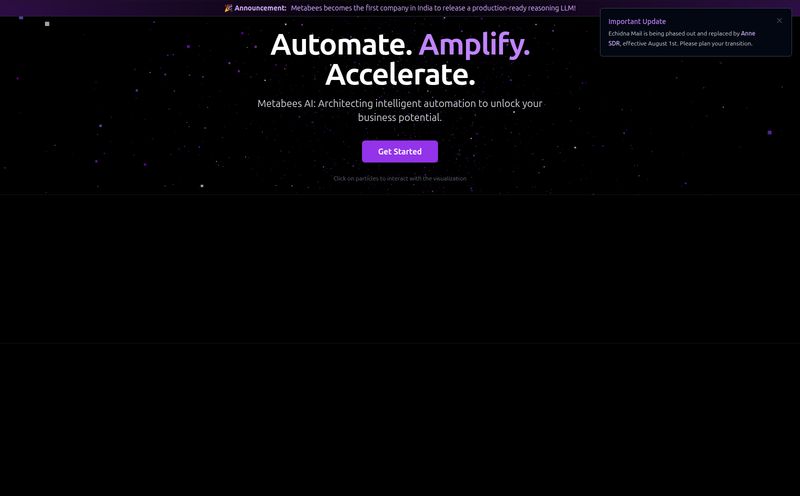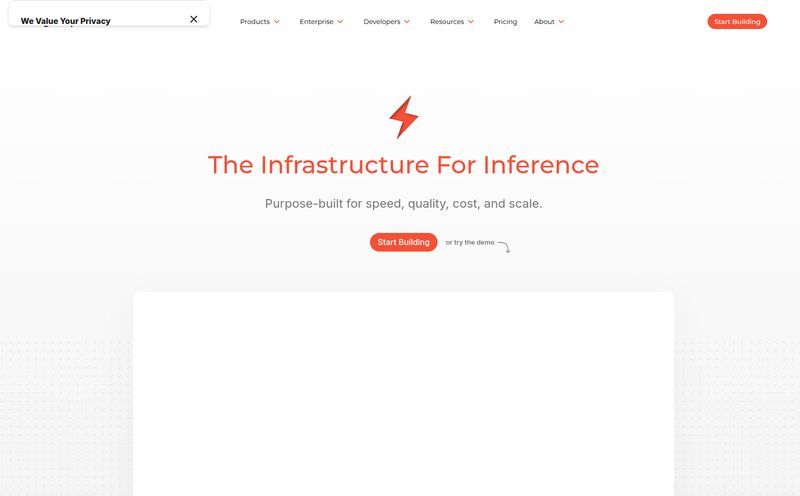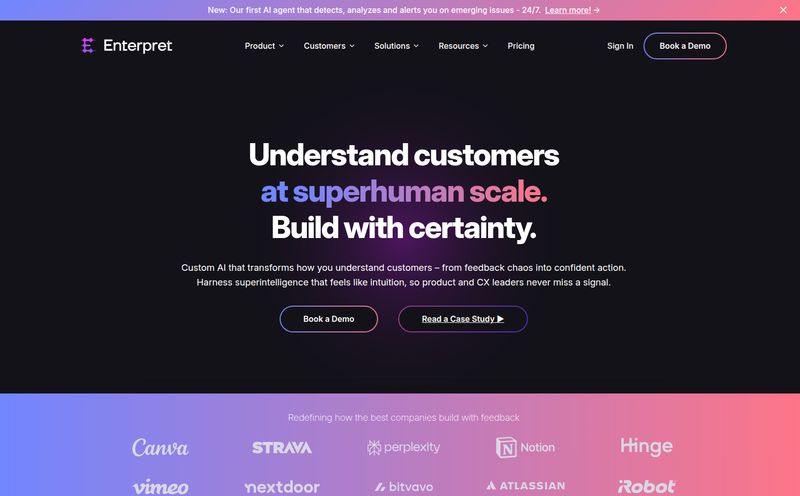Let’s have a little chat. You and me. For years, we’ve been hearing the same story in the AI and MLOps world. “Data is the new oil!” they screamed from the rooftops. And they were right. But they forgot the less glamorous part of the story: where do you store all that oil? And more importantly, how do you keep the storage bill from spiraling into a five-alarm fire that has your finance department banging down your door?
The data deluge is real. We're talking massive datasets for model training, endless checkpoints, and the petabytes of unstructured data needed to feed the beast that is generative AI. Standard cloud storage, while great, can feel like you're trying to empty the ocean with a leaky bucket. The costs just keep climbing, and performance can get sluggish when you need it most.
I’ve seen dozens of companies try to solve this. Most are just variations on a theme. But every now and then, a tool pops up that makes me lean in a little closer. Today, that tool is UltiHash. It’s making some bold claims about being a lightning-fast object storage solution built specifically for AI workloads. But is it just marketing fluff or is there something real here? Let's find out.
So, What's the Big Deal with UltiHash?
At its core, UltiHash is a high-performance object storage system. Think of it like a specialized, high-tech warehouse for your data. But instead of just stacking boxes, it intelligently organizes everything to save a ton of space and find things faster. Its main promise is to drastically cut your storage costs without making you sacrifice the speed your AI models crave. A bold claim, I know.

Visit UltiHash
The secret sauce, and the thing that really caught my eye, is its approach to data. It's not just another S3 clone—though it is S3-compatible, which is a massive plus we'll get to later. It's designed from the ground up to handle the unique, often repetitive nature of AI data. This isn't just about storing your vacation photos; it's about managing the lifeblood of modern machine learning.
The Magic Under the Hood
Okay, so how does it actually work? It's not magic, but it’s pretty clever engineering. There are a few key features that make UltiHash stand out from the crowd.
S3 Compatibility is Your Easy Button
First things first, let's talk about the S3-compatible API. If you've ever worked in the cloud, you know that S3 is the lingua franca of object storage. Almost every tool, framework, and application knows how to speak S3. By being compatible, UltiHash basically says, "Don't worry, you don't have to rebuild your house." You can point your existing applications to UltiHash, and they should just… work. This lowers the barrier to entry so much. It’s the difference between a simple engine swap and engineering a whole new car. For any ops team, this is a huge sigh of relief.
Deduplication: The Real Money-Saver
This is the feature that made me sit up and pay attention. UltiHash has built-in data deduplication. What does that mean in plain English? Imagine you have a massive dataset for training an image model. Many of those images, or at least chunks of the data within them, are going to be very similar or even identical. Model checkpoints also share huge amounts of unchanged data between versions.
Instead of storing a thousand nearly identical copies of the same data chunk, deduplication stores one copy and then uses tiny pointers for all the other instances. It’s like having one physical book in a library and giving everyone else a library card that points to it, instead of printing a new book for every single person. The result? You can store the same amount of logical data in a fraction of the physical space. And less physical space means a smaller bill. Simple as that.
Kubernetes-Native Means Its Built for Modern Stacks
UltiHash is also Kubernetes-native. For the non-DevOps folks, this means it was born and raised in the world of modern, scalable infrastructure. It’s not some old piece of software that's been awkwardly stuffed into a container. It's designed to be deployed, managed, and scaled using Kubernetes, which has become the standard for orchestrating applications. This gives you incredible control and flexibility, allowing you to run it wherever your Kubernetes clusters live—on-premises, in AWS, Google Cloud, you name it.
Choose Your Flavor: Serverless or Self-Hosted
I’m a big fan of flexibility, and UltiHash offers two main ways to use their platform, which caters to different types of teams.
The Serverless Approach (Still in Beta!)
Got an idea and want to get started fast? The serverless option is for you. UltiHash manages the infrastructure for you (currently on providers like Hetzner and AWS in the EU). You just choose your capacity and go. This is perfect for teams that don't have, or don't want to dedicate, SRE or DevOps resources to managing storage infrastructure. One important note: this option is currently in Beta. So, while it's great for development and testing, you might want to be a little cautious before throwing your most critical production workload on it just yet.
The Self-Hosted Route for Full Control
This is for the teams who want to run the show. With the self-hosted option, you deploy UltiHash on your own Kubernetes clusters. This gives you maximum control over your data, security, and performance tuning. You can run it in your own VPC on a public cloud or even on your own bare-metal servers in a private data center. This is the path for established companies with specific compliance needs or those who want to integrate storage deeply into their existing infrastructure.
So, Who Is This Really For?
While any data-heavy application could benefit, UltiHash is clearly planting its flag in the AI/ML territory. The use cases they highlight tell the story:
- Generative AI: Think about the data needed for RAG (Retrieval-Augmented Generation) or storing vast libraries of images, text, and video. Deduplication could be a game-changer here.
- Model Training: Storing and versioning multi-terabyte datasets and model checkpoints is a classic storage headache. Reducing that footprint by 50-80% (a figure they suggest is possible) is incredibly appealing.
- Data Lakehouse: As more companies build lakehouses on top of object storage, performance becomes critical. A high-throughput storage layer that integrates with tools like Presto and Trino is essential.
Industries like autonomous vehicles and advanced manufacturing, which generate endless streams of sensor data, also seem like a perfect fit. All that repetitive telemetry data is just begging to be deduplicated.
Let's Talk Money: A Look at UltiHash Pricing
Alright, the all-important question: what's this going to cost me? The pricing model is split between the self-hosted and serverless offerings. I’ve always appreciated transparent pricing, and they do a decent job of laying it out. It's refreshing.
Here’s a simplified breakdown of the Self-Hosted model:
| Plan | Price | Best For | Key Features |
|---|---|---|---|
| Starter | Free | Development & testing | Up to 10 TB storage, Community support |
| Premium | From $7.20 /TB/month | Production environments | Up to 1 PB storage, Custom support + SLA |
| Enterprise | Contact for Pricing | Large-scale architecture | 1 PB+ storage, Erasure coding, Custom SLA |
The Serverless pricing is a bit different, billed per GB per day of use. For example, a 10 TB cluster would cost you around €0.10 per GB for the days you use it. This pay-as-you-go model is fantastic for unpredictable workloads or short-term projects.
My Two Cents: The Good and The Could-Be-Better
No tool is perfect, and after digging in, I have a few takeaways.
Honestly, the deduplication focus is what sells it for me. It’s a real, tangible benefit that directly addresses the cost problem in AI. The S3-compatibility and Kubernetes-native design show they understand the modern tech stack. And the free Starter tier is genuinely useful, not just a crippled demo. I appreciate that they let you kick the tires with up to 10 TB.
On the other hand, the Serverless option being in Beta is a point of caution. I’m excited about it, but I wouldn't bet the farm on it until it's battle-tested and generally available. Also, the classic “Contact us for Pricing” for the Enterprise tier is a standard industry practice, but it always feels a bit like stepping into the unknown. But for large-scale deployments, custom pricing is probably unavoidable.
Frequently Asked Questions
- Is UltiHash a full replacement for Amazon S3?
- It can be, for specific workloads. Its S3-compatible API means it can function as a drop-in replacement in your application's configuration. However, it's optimized for AI/ML and data-heavy use cases where deduplication provides a major cost advantage, not necessarily for hosting a simple static website.
- How does UltiHash's deduplication actually save money?
- It saves money by reducing the amount of physical storage you need to pay for. By identifying and storing only one copy of duplicate data blocks, it can significantly shrink the total storage footprint of your datasets, which directly translates to a lower monthly bill from your cloud provider or lower hardware costs on-prem.
- Can I really try UltiHash for free?
- Yes. The self-hosted Starter tier is free and allows for up to 10 TB of storage. This is a very generous offering for development, testing, or small-scale projects.
- What does "Kubernetes-native" mean for my team?
- It means UltiHash is designed to be managed using the same tools and workflows your DevOps team already uses for your other applications. This simplifies deployment, scaling, and monitoring, making it easier to integrate into a modern, automated CI/CD pipeline.
- Is the Serverless option ready for my main application?
- Since it's currently in Beta, it's best suited for development, staging environments, or non-critical workloads. For mission-critical production applications, you should probably stick with the self-hosted production tiers or wait for the serverless offering to become generally available.
The Final Verdict
So, is UltiHash the answer to all our AI storage prayers? Maybe not all of them, but it’s making a compelling case. It’s not trying to be everything to everyone. It's a specialized tool for a specialized, and rapidly growing, problem.
If you're a team drowning in AI data, watching your S3 bill with a sense of dread, and running on a modern Kubernetes stack, then UltiHash should absolutely be on your evaluation list. The combination of cost savings from deduplication and the ease of integration via the S3 API is a potent one-two punch. It’s a serious contender that understands the real-world pains of MLOps and data engineering today.



